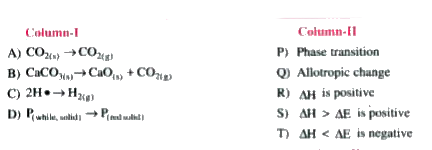For the reaction 2H2(g)+o2(g)→2H2O(g),ΔH∘=−573.2kJ. The heat of decomposition of water per mol is: Solution in Telugu
286.6kJ
573.2 kJ
−28.66 k Cal
68.56 kCal
The correct Answer is:A, D
For decompsition +573.2→2 mol
? → 1mol
Δ=573.22 = 286.6kJ/mol = 68.56 Kcal/mol
Topper's Solved these Questions
- CHEMICAL THERMODYNAMICSBOOK - AAKASH SERIESCHAPTER - CHEMICAL THERMODYNAMICSEXERCISE - PRACTICE SHEET (EXERCISE- II) (LEVEL- II (ADVANCED) LINKED COMPREHENSION TYPE QUESTIONS)
5 Videos
- CHEMICAL THERMODYNAMICSBOOK - AAKASH SERIESCHAPTER - CHEMICAL THERMODYNAMICSEXERCISE - PRACTICE SHEET (EXERCISE- II) (LEVEL- II (ADVANCED) MATRIX MATCHING TYPE QUESTIONS)
2 Videos
- CHEMICAL THERMODYNAMICSBOOK - AAKASH SERIESCHAPTER - CHEMICAL THERMODYNAMICSEXERCISE - PRACTICE SHEET (EXERCISE- II) (LEVEL- II (ADVANCED) STRAIGHT OBJECTIVE TYPE QUESTIONS)
4 Videos
- CHEMICAL THERMODYANMICS BOOK - AAKASH SERIESCHAPTER - CHEMICAL THERMODYANMICS EXERCISE - Questions For Descriptive Answers
28 Videos
- ELECTRON MIGRATION EFFECTS BOOK - AAKASH SERIESCHAPTER - ELECTRON MIGRATION EFFECTS EXERCISE - QUESTIONS FOR DESCRIPTIVE ANSWERS
10 Videos
Similar Questions
Enthalpy of neutralization is defined as the enthalpy change when 1 mole of acid/base is completely neutralized by base/acid in dilute solution. For strong acid and strong base neutralization net chemical change is H+(aq)+OH−(aq)→H2O(l),ΔH0r≡−55.84kJ/mol
If enthalpy of neutralization of CH3COOH by NaoH is -49.86 kJ/mol then enthalpy of ionisation of CH3COOH is
View SolutionMatch the following columns

View SolutionFor the real gases reaction 2CO(g)+O2(g)→2CO2(g),ΔH=−560kJ. In a 10L rigid vessel at 500K, the initial pressure is 70 bar and after reaction it becomes 40 bar. The change in internal energy is:
View SolutionHow does heat of neutralisation value change with the chemical nature of acid and base?
View SolutionHyperconjugation effect is also termed as 'no bond resonance'. Why?
View SolutionCombustion of hydrogen in a fuel cell at 300 K is represented as 2H_(2(g))+O_(2(g)) rarr 2H_(2)O_((g)) . If Delta H and Delta G are -241.60 kJ mol^(-1) and -228.40 kJ mol^(-1) of H_(2)O . The value of DeltaS for the above process is
View SolutionFor the reaction, 2H_(2)(g)+O_(2)(g) to 2H_(2)O(g), DeltaH=-573.2kJ The heat of decomposition of water per mole
View SolutionFor the reaction 2H_(2)(g)+O_(2)(g) to 2H_(2)O(g), DeltaH^(ө)=-573.2kJ The heat of decomposition of water per mole is
View SolutionWith the help of a thermochemical equation, calculate Delta_(f)H^(@) at 298 K for the following reactions : "C(graphite)" + O_(2)(g) rarr CO_(2)(g) , Delta H = -393.5 kJ//mol H_(2)(g) + (1)/(2)O_(2)(g) rarr H_(2)O(l) , Delta_(f)H^(@) = -285.8 kJ//mol CO_(2)(g) + 2H_(2)O(l) rarr CH_(4)(g) + 2O_(2)(g) , Delta_(f)H^(@) = +890.3 kJ//mol
View SolutionIn the reaction 2H_(2)(g) + O_(2)(g) rarr 2H_(2)O (l), " "Delta H = - xkJ
View SolutionFind the bond energy of the C - H bond form the following data
(a)CH4(g)+2O2(g)→2H2O(g)+CO2(g)ΔH=−803.3kJ(b)C (graphite)→C(g)ΔH=+711.3kJ(c)2H2(g)→4H(g)ΔH=+866.1kJ(d)2H2O(g)→2H2(g)+O2(g)ΔH=+485.3kJ(e)CO2(g)→C(graphite)+O2(g)ΔH=+393.3kJ
View SolutionWhich statement is ture for reaction ? 2H_(2) (g) + O_(2) (g) rarr 2H_(2) O (g)
View SolutionThe heat change accompanying the reaction
2H2(g)+O2(g)→2H2O(l) :
ΔH=−136kcal is called
View SolutionFor the thermochemical equation,
2H2(g)+O2(g)→2H2Ol,ΔH=−571.6kJ
Heat of decomposition of water is :
View SolutionFor the reaction, 2H_(2)O(g) rarr 2H_(2)(g) + O_(2)(g), Delta H = 571.6 kJ Delta_(f) H^(theta) of water is:
View Solution
